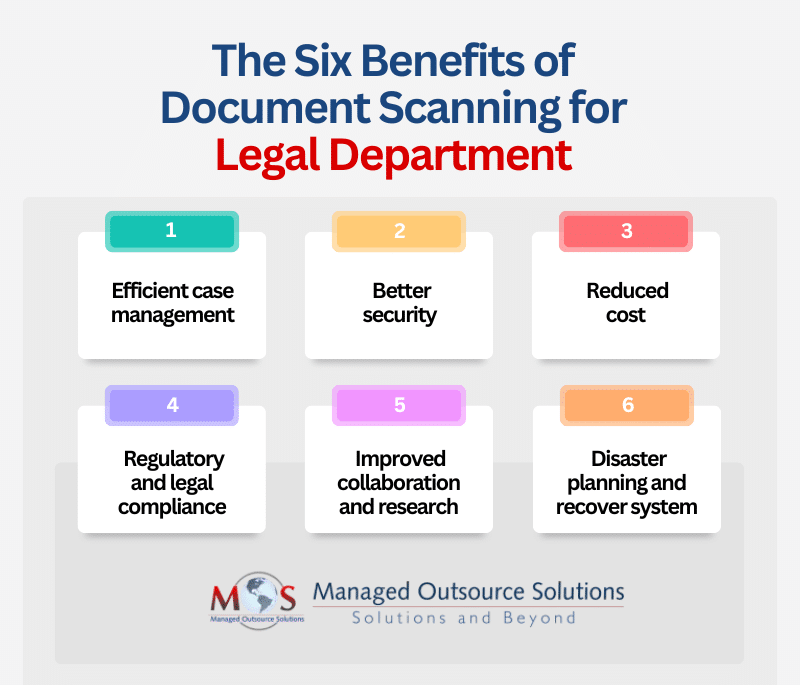The legal industry routinely collects and assembles a variety of legal documents such as contracts, legal briefs, and research materials. For decades, law firms have been handling manual paperwork which is tedious, time-consuming, and error prone. However, the advent of technology has transformed document management systems from paper-based to digital systems for legal departments. Today, leveraging the benefits of legal document scanning services is imperative for legal entities to achieve success.
Data security and easy file access are the key reasons why organizations adopt digitization and cloud technology. The shift to digital documents is now a necessity for law firms. Partnering with a reputable document scanning company with considerable experience in this area can help them scan multiple records quickly, while safeguarding confidential, sensitive or delicate documents. Deploying a robust document management system can ease access to legal documents from anywhere, at any time.
What Are Document Scanning Services?
Document scanning is the perfect solution for the legal sector that deals with numerous types of paperwork, such as contracts, affidavits, and NDAs. As court systems are increasingly accepting electronic filings, digitized documents help to boost productivity and regulatory compliance. The digital legal records are a cost-effective storage system that also maintains the accuracy and safety of legal documents. With a secure data management system, legal departments can streamline their operations and mitigate the hassles of dealing with a vast amount of physical paperwork.
The various types of legal documents that document scanning services specialize in include:
- Contracts and agreements
- Memorandums
- Litigation
- Tax documents
- Court filings and pleadings
- Business licenses and permits
- Partnership deals
- Foreclosure
Top Advantages of Document Scanning for Legal Departments
- Efficient Case Management: Document scanning offers easy accessibility of legal documents by enabling a centralized electronic document management system. With digitized documents, law firms can preserve the integrity of files. They also facilitate resourceful storage systems according to various criteria such as case number, client name, and document type, allowing legal professionals to focus on their core activities. Advanced indexing and organization of legal documents streamline operational workflow by allowing instant document retrieval. With the rise of remote work, this enables immediate access to documents for legal professionals, regardless of their location.
- Better Security: Manual document management leaves legal documents prone to security risks and data breaches. Moreover, physical documents are easily exposed to vulnerable conditions such as misplacement, fading, and damage by natural disasters. As legal professionals handle sensitive and confidential information, protection of legal documents is a top priority for legal departments.
Document scanning ensures robust security measures for document protection using the latest cyber security protocols such as encryption, passwords, or biometric authentication. This allows law firms to add an extra layer of protection to high security documents on role-based access control to prevent any unauthorized access. Additionally, digitization allows cloud backup services, which mitigate cyber-attacks and ensure long-term preservation of legal documents.
- Reduced Cost: Old-fashioned physical document management requires additional physical space and costs for storage of documents in filing cabinets. Document scanning prevents piles of excess paperwork and cluttering workspace, thereby freeing up physical office space for productive use. Optimized resource allocation allows for enhanced office space utilization by reducing the need to store physical documents.
Although the initial investment for document scanning may seem high, digital documents contribute to a sustainable financial model in the long run. By eliminating extra expenditure related to tasks such as printing, collecting, and archiving documents, law departments can save revenue associated with the management of physical documents.
- Regulatory and Legal Compliance: In the legal sector, lawyers are duty-bound to uphold the principles of professional conduct and ethics while performing duties for their clients. This includes storing documents in specific formats to meet enterprise compliance required for document retention and management. Manual document management makes the legal department vulnerable to various repercussions, such as litigation, fines, or penalties. A lapse in regulatory compliance may result in consequences such as an issue of censure, reputational damage and client dissatisfaction. Document scanning helps to minimize these risks by fulfilling legal and regulatory obligations, as digital records are easy to store and secure.
To ensure high levels of document security, legal advisors must have an understanding of various regulatory requirements, such as HIPAA, GDPR and SOX. Digital file management helps businesses adhere to industry-specific regulations. Document scanning creates an accurate and complete record management system that can be updated along with new and changing regulations to safeguard client information.
- Improved Collaboration and Research: The document scanning process allows for easy categorization, indexing, and tagging of legal documents to reduce time previously spent on storing, locating, and organizing the documents. With modern digital scanning services, all legal documents are accounted for and easy to access when needed. This is highly beneficial when multiple people have to access, work on or edit the same document simultaneously. An enhanced collaboration among team members translates into an increase in efficient and productive output for legal cases. Since multiple people can access and make numerous edits, it is vital to keep track of the various versions of the edited document and determine who made it. A meticulous tracking of scanned documents ensures no one is working on an outdated version and eliminates duplicate files.
When working with clients and various cases, it is essential for the legal department to streamline their research process to accelerate turnaround time for document-related inquiries. Legal specialists can improve research as digital files allow searching for specific keywords or tags required. As clients expect prompt responses from their legal department, an efficient document management system can increase the quality of customer service.
- Disaster Planning and Recovery System: The legal industry generates an enormous volume of documents that are critical for each case. The security of these documents is mandatory in the high-stakes legal environment. It is the responsibility of legal departments to ensure the safety of the legal documents with a robust disaster planning and recovery system in place.
The ability to react and adapt quickly in the event of any disaster is dependent on how well-designed the disaster response plan is for each scenario. By digitizing legal documents, the legal department can deploy a dependable data backup system. A client portal that stores all digital documents of each client ensures a reliable storage system for secure document retention. Document scanning services offer both on-site and cloud backup solutions for additional security and recoverability. A strategic disaster recovery framework enables legal departments to sustain critical functions through any disruptive event with resilience and agility.
By partnering with a document scanning company, legal departments can reap the above benefits to deliver the highest quality service to their clients. They use the the right steps that can streamline the digitization process and enhance the security of your critical information.





